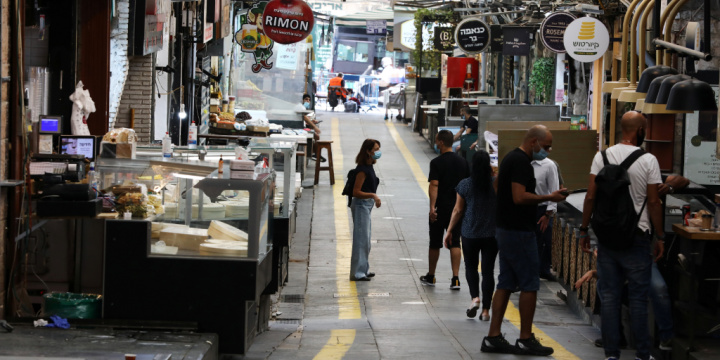Meanwhile, the Ministerial Committee on Defining Restricted Zones on Sunday night approved the recommendation of both the Health Ministry and Coronavirus Project Coordinator Ronni Gamzu to declare the Druze town of Majdal Shams—in the southern foothills of Mount Hermon in the Golan Heights—a restricted zone. The decision was made due to the community’s COVID-19 morbidity rising for five days in a row.
In a joint statement, the PMO and Health Ministry said that the local lockdown will go into effect at 6 pm on Monday and last until 6 pm on Saturday.
At the start of Sunday’s weekly Cabinet meeting, Israeli Prime Minister Benjamin Netanyahu addressed the pandemic at home and abroad.
“The world is being inundated with a powerful wave [of coronavirus cases], and we see this in Europe,” he said. “It is heart-rending.”
Many world leaders “now understand that [the Israeli government’s lockdown] decisions … led to a significant reduction and a dramatic decline in the scope of morbidity in Israel,” he added.
‘I wish our scientists success’
Netanyahu went on to warn however that for Israel to maintain its achievements in this regard, “we must stick to a gradual and responsible exit, and not open up too fast,” despite the difficulties the lockdown has imposed on many Israelis.
“I am familiar with the difficulties faced by businesses, the self-employed and families and parents,” he stated. “Therefore, I first ask for your continued cooperation, which has led to this result.” He emphasized that all government directives must be adhered to—“not just masks and distancing, but [all] Cabinet directives.”
A proposal to increase fines for violations, “so that everyone, without exception, across Israeli society, honors the agreements,” will be submitted to the Cabinet for approval, he said.
This, he said, “is not aimed at any [particular individual or group]; it is aimed at the virus … on behalf of the health of us all.”
Referring to the news that the Israel Institute for Biological Research (IIBR) is scheduled to begin human trials of its BriLife SARS-CoV-2 vaccine as early as next week, Netanyahu said, “I wish our scientists success.”
At the same time, he said, “I am working to bring vaccines from abroad because we need to allow ourselves to be ready for progress on the issue of vaccines, which in the end is the way to delimit the disease and take control of it, as happened with other pandemics.”
According to Health Ministry data, Israel’s morbidity rate stood at 2.8 percent on Sunday, down from just over 15 percent at the height of the “second wave” of the virus.
As of Monday afternoon, the total number of confirmed coronavirus cases in Israel since the start of the pandemic stood at 310,254, 14,002 of which were considered active. There were 510 patients in serious condition, with 205 on ventilators. Since the onset of the pandemic, 2,404 people in Israel have died of the disease.
 US Stops UN From Recognizing a Palestinian State Through Membership
US Stops UN From Recognizing a Palestinian State Through Membership Jordan Reaffirms Commitment to Peace With Israel After Iran Attack, Says Ending Treaty Would Hurt Palestinians
Jordan Reaffirms Commitment to Peace With Israel After Iran Attack, Says Ending Treaty Would Hurt Palestinians ‘Crisis at Columbia’: Elite University Spirals Into Chaos Against Backdrop of School President’s DC Testimony
‘Crisis at Columbia’: Elite University Spirals Into Chaos Against Backdrop of School President’s DC Testimony ‘A Time for Vigilance’: FBI Director Says Agency on Alert for Threats Against Jewish Community During Passover
‘A Time for Vigilance’: FBI Director Says Agency on Alert for Threats Against Jewish Community During Passover New Haggadah Released for Israeli Soldiers in Gaza Ahead of Passover
New Haggadah Released for Israeli Soldiers in Gaza Ahead of Passover ADL Data Reveals Alarming Campus Antisemitism, Despite Strong Jewish Life
ADL Data Reveals Alarming Campus Antisemitism, Despite Strong Jewish Life New Hospital Approved for Construction in Southern Israel Amid Gaza War
New Hospital Approved for Construction in Southern Israel Amid Gaza War UN Security Council to Vote Thursday on Palestinian UN Membership
UN Security Council to Vote Thursday on Palestinian UN Membership New Play Opening in NY Recounts Verbatim Testimonies From Oct. 7 Survivors, Families of Victims
New Play Opening in NY Recounts Verbatim Testimonies From Oct. 7 Survivors, Families of Victims




 US Announces New Sanctions on Iran After Missile, Drone Strike on Israel
US Announces New Sanctions on Iran After Missile, Drone Strike on Israel ‘A Time for Vigilance’: FBI Director Says Agency on Alert for Threats Against Jewish Community During Passover
‘A Time for Vigilance’: FBI Director Says Agency on Alert for Threats Against Jewish Community During Passover Anti-Israel Activists Protest Outside US, Israeli Pavilions at Venice Biennale, Accuse Jewish State of Genocide
Anti-Israel Activists Protest Outside US, Israeli Pavilions at Venice Biennale, Accuse Jewish State of Genocide ‘Crisis at Columbia’: Elite University Spirals Into Chaos Against Backdrop of School President’s DC Testimony
‘Crisis at Columbia’: Elite University Spirals Into Chaos Against Backdrop of School President’s DC Testimony Gaza Terrorist Spokesperson Reveals How Media Falls for Terror Group’s Lies
Gaza Terrorist Spokesperson Reveals How Media Falls for Terror Group’s Lies